ISLAMABAD: Interior Minister Rehman Malik said Saturday that Pakistan is a sovereign state and the US Central Intelligence Agency (CIA) is neither conducting any operation inside the country nor will it be allowed to do so. 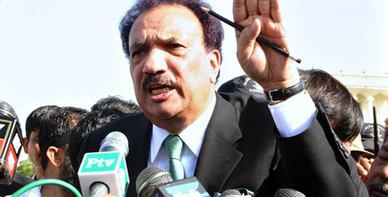 Talking to media outside the parliament, he said the law enforcement agencies are conducting operation against illegal immigrants, adding, the people who are living in Pakistan despite their expiry of visa have also been deported.
He urged the people to stand with national security agencies and criticism on them without any evidence is unjustified as they are fighting for the survival of the country.
He disclosed that timely reporting about 1100 cases by the agencies saved the country from terrorists activities.
Rehman Malik termed the news about deleting of Saleem Shahzad’s data as totally wrong and added that a commission has been formed to probe the killing of Saleem Shahzad.
To another question, he said to maintain the law and order situation is the responsibility of the provinces. Law and order situation in Karachi was under control, he said.
“Rangers were deployed in Karachi on the request of Sindh government to assist the police force. The police strength was not enough to control the law and order situation in Sindh. It will be unfair to blame the whole Rangers personnel for an individuals action”, he said.
He said during the last five month about 48 police personnel have embraced ‘Shahadat’ while taking action against the criminals.
He said all the checkposts in the capital have been restored and the police forces deployed at the checkposts have been directed to check people without any discrimination.
“The government will take all possible measures to protect the live and propriety of the people,” he said. To a question, he replied that IG Police in Islamabad will be appointed soon.
Rockets hit Misrata as infantry backed by artillery attack eastern approach to city, wrong-footing rebels 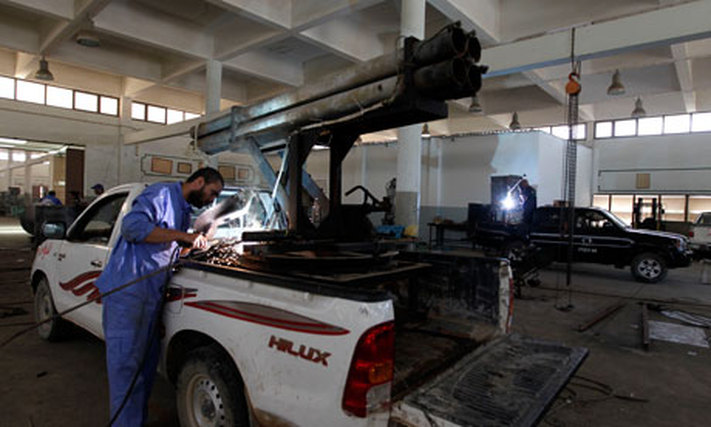 Libyan mechanics weld weaponry onto a pickup truck at an industrial college turned workshop in the besieged city of Misrata. Photograph: Hassan Ammar/AP Muammar Gaddafi's forces have defied Nato warnings , reportedly killing a woman and wounding two children in rocket strikes on Misrata and launching a big attack to the east of the city.
The rocket attack in Habara , between the port and city centre, was the first time artillery has inflicted casualties in Misrata since rebel troops pushed government forces out of the city on 12 May.
Infantry forces backed by artillery launched a surprise attack on Kararimat, the eastern end of the enclave. The Hikma hospital reported 11 dead and 41 wounded from the attack. Radio Misrata said the rebel frontline had held off the assaults, which continued into the late afternoon.
The rebels, who were expecting Gaddafi's forces to attack from the west, were wrong-footed by the assault.
"Gaddafi brought his troops around and attacked from the other side," said Adel Ibrahim of Radio Misrata. "Now they are hitting civilian areas. One woman is killed, her children are hurt."
The attacks represent an act of defiance from the Gaddafi regime, three days after Nato dropped thousands of leaflets over government lines featuring pictures of an Apache helicopter and warning of attacks if civilian areas were shelled.
Nato has been wrestling with the problem of how to respond to continued rocket strikes on the enclave, with British commanders reportedly saying that the Apaches are too vulnerable to risk attacking by day. No Apache strikes have been reported since Friday's attacks, but Nato bombers flew over Misrata earlier in the day, followed by 23 explosions to the west of the city.
Ibrahim echoed a common complaint heard across the city as the death toll mounts. "Where is Nato?' he said. "It seems they are on holiday."
IMF rejection of proposals over Kabul Bank crisis, $820m bailout debts and suspension of aid leaves country in deepening crisis 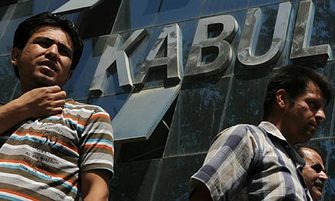 The Afghan government will struggle to pay its bills "within a month" after the International Monetary Fund rejected proposals for resolving the Kabul Bank scandal, western officials have warned.
Although the war-torn country's biggest bank nearly collapsed last September, the government of Hamid Karzai and the international community are still at loggerheads over plans to fund an $820m (£507m) bailout as well as how the disgraced former managers and shareholders who helped themselves to hundreds of millions of dollars should be prosecuted.
As long as the IMF declares the plans to be inadequate, many countries, including Britain, are legally barred from pumping money into a government that is almost completely reliant on foreign cash to pay civil servants' salaries.
It was reported by Reuters that the IMF has now formally rejected the Afghan government's proposals, meaning aid disbursements will remain on hold. The failure to reach a deal by a deadline of last Saturday also meant a $70m payment from the World Bank's Afghan reconstruction trust fund was automatically withheld.
Two senior western officials said the government will face a cash crisis in the coming weeks and could struggle to pay staff bills, although one predicted this would be avoided by cutting other spending priorities.
Last month, Omar Zakhilwal, the country's finance minister, told the Guardian that suspension of aid payments "has already had an effect on us, no doubt about it". He insisted that the Afghan government had done "95% of what was asked of us" by the IMF, including effectively nationalising Kabul Bank, stripping the shareholders of their rights and putting all unrecovered loans into receivership.
But although he claimed the remaining issues "were inconsequential to Kabul Bank" the IMF sees two aspects as vitally important. Firstly, an agreement that Afghan taxes, not foreign aid, will repay the $820m taken out of central bank reserves last year to prop up the bank. Second, they want serious criminal investigations against managers and shareholders, many of whom enjoy high level political support, who illegally borrowed huge sums of interest-free cash from the bank.
Although the finance ministry has drawn up plans to increase its tax-raising efforts in order to pay off the bailout in annual instalments, horrified MPs have already rejected one budget request for $73m and is also likely to reject a supplemental budget due to be presented by Zakhilwal soon.
"The IMF tells me, this is our demand, give me condition by this date the parliament must approve this line in the budget," explained Zakhilwal. "I am a minister, can I chose the parliament timeline? On these issues the international community totally disregards the legal processes of Afghanistan."
Many MPs argue that the money should be found by simply selling off the assets illegally bought by shareholders and managers, including a gas distribution company, an airline and luxury villas in Dubai.
Although a $10m forensic audit by Kroll may help identify many deliberately hidden assets, most western experts doubt more than half of the outstanding $910m will be recovered. So far just $61m has been retrieved.
Zakhilwal also argued that prosecutions could only be handled by the attorney general and warned that the complicated inquiry cannot be rushed.
"The attorney general can arrest people, but after 15 days with not case they have to be acquitted – that would be even more embarrassing for us," Zakhilwal said.
Although the finance minister insisted the attorney general was "absolutely committed" to a thorough investigation, the international community is sceptical, not least after Afghanistan's top law officer threw out a case last year against one of Karzai's key aides who had been wire-tapped soliciting a bribe.
One alternative plan is for a special court of handpicked judges deemed to be reasonably honest and well-versed in finance to hear the case.
Credible prosecutions are vital, not just to appease public anger, but also because many of Kabul Bank's assets are in Dubai. Under United Arab Emirates law it is impossible to seize properties until criminal investigations have begun.
Not only does Afghanistan face a cash crunch, the showdown with the IMF also threatens to derail plans, pushed hard by Hamid Karzai, for a far greater proportion of international aid to be spent through official channels, rather than on projects outside the control of the government.
A key element of the "transition" strategy by which the foreign intervention in Afghanistan will be greatly reduced by the end of 2014, the international community last year agreed that 50% of spending will go through the government by 2012.
But it is now feared that if the Afghan government continues to be considered unworthy of international investment by the IMF the country will have to return to patchwork of bilateral funding agreements.
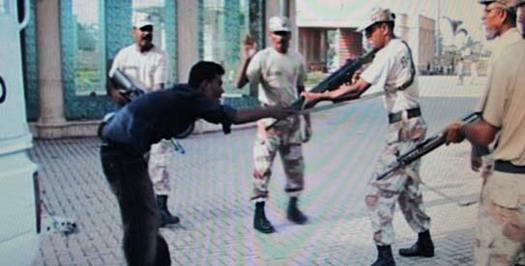 KARACHI: An anti-terrorism court on Friday sent seven accused, including six Rangers personnel, to jail over the killing of Sarfaraz Shah, DawnNews reported.
Earlier on Monday, six personnel of Pakistan Rangers, Sindh, and a civilian were remanded in police custody by the administrative judge of the anti-terrorism courts in Karachi for their involvement in the June 8 shooting to death of the unarmed young man.
Widely televised footage showed the youth, Sarfraz Shah, being shot at and then left to die by the Rangers personnel in the Shaheed Benazir Bhutto Park within the remit of the Boat Basin police station.
The Rangers had earlier claimed that the youth was armed and killed in an encounter.
However, the video footage aired by television channels clearly showed that the unarmed youth was shot to death by the Rangers personnel at point-blank range as he first pleaded for mercy and later begged to be taken to hospital.
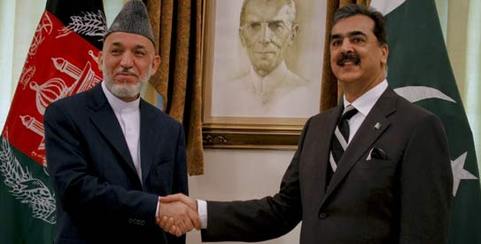 ISLAMABAD: Afghan President Hamid Karzai called on Pakistan to eradicate militant sanctuaries at “detailed” talks Saturday about a peace process with the Taliban that inaugurated a joint peace commission.
Karzai and Prime Minister Yousuf Raza Gilani led the first meeting of a joint commission for reconciliation and peace, pledging that the body would meet again in October and a sub-committee in 20 days to a month.
In another effort to improve ties, a much delayed transit trade agreement between Afghanistan and Pakistan, which was signed last year, is due to come into effect on Sunday, Islamabad said.
The Taliban-led insurgency in Afghanistan is now into a 10th year with violence at record levels. Pakistan is also fighting a home-grown Taliban insurgency in its northwest and there are near daily militant bomb attacks.
“The facts are so bare and the wound is so clear and hurting that it requires both of us to work diligently and extremely aggressively and effectively to curb terrorism and radicalism in the region,” Karzai said.
Asked about swarms of militants attacking Pakistani troops close to the Afghan border, Karzai said the attacks were “all the more reason for us to work harder to remove radicals from both countries and to remove sanctuaries”.
Gilani insisted that Pakistan wanted a stable, peaceful, prosperous, independent and sovereign Afghanistan, saying that Islamabad was ready to provide “whatever support they want” in the Afghan-led peace process.
“We have discussed in detail the peace process, with all stakeholders and certainly what happened in our capacity is a readiness,” said Gilani.
But when asked if the Haqqanis or Pakistan’s arrest last year of Mullah Abdul Ghani Baradar, said to be the Taliban second-in-command, could be part of the reconciliation process neither leader went into detail.
The Taliban have rejected peace overtures in public, although some experts believe the death of bin Laden, whom Taliban supreme leader Mullah Omar refused to surrender after the September 11, 2001 attacks, could be a spur.
Pakistan was a main ally of the Taliban until it joined the US-led “war on terror” following the attacks on New York and Washington and subsequently started fighting a home-grown Taliban insurgency along the Afghan border.
But its intelligence services are thought to maintain links to Afghan insurgents with strongholds on its territory, namely the Haqqani network, one of the staunchest US enemies in Afghanistan, and Afghan Taliban leaders.
Fighting between the Taliban and US-led Nato troops in Afghanistan has become deadlier each year since the 2001 invasion.
The 130,000 international troops today in the country are due to start limited withdrawals from July with the Afghan police and army scheduled to take control of security gradually before the end of 2014.
In Pakistan, more than 4,400 people have been killed in attacks blamed on Taliban and other extremist networks based in the tribal belt since 2007.
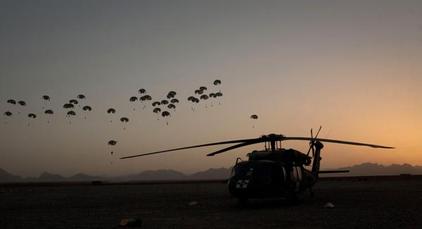 CONGRESSIONAL REPORT Nation-building efforts in peril, investigation findsThe hugely expensive U.S. attempt at nation-building in Afghanistan has had only limited success and may not survive an American withdrawal, according to the findings of a two-year congressional investigation to be released Wednesday. Small parachutes bearing food supplies for U.S. Marines are dropped from a plane outside Forward Operating Base Edi in southern Afghanistan’s Helmand province. The report calls on the administration to rethink urgently its assistance programs as President Obama prepares to begin drawing down the number of U.S. troops in Afghanistan this summer. The report, prepared by the Senate Foreign Relations Committee’s Democratic majority staff, comes as Congress and the American public have grown increasingly restive about the human and economic cost of the decade-long war and reflects growing concerns about Obama’s war strategy even among supporters within his party. The report describes the use of aid money to stabilize areas the military has cleared of Taliban fighters — a key component of the administration’s counterinsurgency strategy — as a short-term fix that provides politically pleasing results. But it says that the enormous cash flows can overwhelm and distort local culture and economies, and that there is little evidence the positive results are sustainable. One example cited in the report is the Performance-Based Governors Fund, which is authorized to distribute up to $100,000 a month in U.S. funds to individual provincial leaders for use on local expenses and development projects. In some provinces, it says, “this amount represents a tidal wave of funding” that local officials are incapable of “spending wisely.” Because oversight is scanty, the report says, the fund encourages corruption. Although the U.S. plan is for the Afghan government to eventually take over this and other programs, it has neither the management capacity nor the funds to do so. The report also warns that the Afghan economy could slide into a depression with the inevitable decline of the foreign military and development spending that now provides 97 percent of the country’s gross domestic product. The “single most important step” the Obama administration could take, the report says, is to stop paying Afghans “inflated salaries” — often 10 or more times as much as the going rate — to work for foreign governments and contractors. Such practices, it says, have “drawn otherwise qualified civil servants away from the Afghan government and created a culture of aid dependency.” Even when U.S. development experts determine that a proposed project “lacks achievable goals and needs to be scaled back,” the U.S. military often takes it over and funds it anyway, the report says. It also cites excessive use and poor oversight of contractors. Although the report provides some examples of successful projects, it is critical overall of what one senior committee aide called the U.S. focus on a rapid “burn rate” of available funding as a key metric for success. The aide spoke on the condition of anonymity to discuss the report before its release. Debate has begun within the White House and in Congress over how quickly to begin withdrawing the 100,000 U.S. troops in Afghanistan, with senior Defense Department figures cautioning against a precipitous drawdown this summer. Defense Secretary Robert M. Gates has called for a “modest” decrease that would avoid jeopardizing recent combat gains. Sen. Carl Levin (D-Mich.), chairman of the Armed Services Committee, told reporters Tuesday that he would like to see a minimum of 15,000 U.S. troops withdrawn by the end of the year. Sen. John McCain (Ariz.), the committee’s ranking Republican, was quoted in the Financial Times as saying that he thought the number should be no more than 3,000. But an increasing number of lawmakers on both sides have called for a more wholesale reconsideration of Obama’s strategy in Afghanistan, saying that the war’s cost cannot be sustained at a time of domestic economic hardship. They point as well to changing realities on the ground, including signs of growing extremist violence in Pakistan and the killing last month of al-Qaeda leader Osama bin Laden. “I’m personally for changing the military strategy to some degree,” Sen. John F. Kerry (D-Mass.), chairman of the committee, said in an interview. Because the military and civilian components are tightly intertwined in Afghanistan, Kerry said, both have to be considered at the same time. “We’ve created a . . . wartime economy” that is a “huge distortion” of Afghanistan’s revenue production, he said. “It’s very dangerous, and we have to get a handle on it rapidly.” Kerry said that the committee’s report was not “a gotcha” but that it was intended to help the administration “think through and analyze” how to proceed. The report was distributed Tuesday to Democratic committee members and to Sen. Richard G. Lugar (Ind.), the ranking Republican. The administration has requested $3.2 billion for Afghanistan reconstruction projects in the coming fiscal year. The report argued that the foreign aid program must continue because “the goal should be to reduce some of the political pressure to spend money quickly, especially when the conditions are not right.” All U.S. development projects in Afghanistan should be reexamined, it adds, to determine whether they are “necessary, achievable, and sustainable.” The report recommends multi-year congressional funding for the aid program that would plan ahead for the increased civilian responsibilities as the number of troops decreases and calls for “a simple rule: donors should not implement projects if Afghans cannot sustain them.” Last week, the bipartisan Commission on Wartime Contracting in Iraq and Afghanistan said in a separate report that billions of dollars in U.S.-funded reconstruction projects in both countries could fall into disrepair over the next few years because of inadequate planning to pay for their ongoing operations and maintenance. That report warned that “the United States faces new waves of waste in Iraq and Afghanistan.” Foreign aid expenditures by the State Department and the U.S. Agency for International Development in Afghanistan, about $320 million a month, pale beside the overall $10 billion monthly price tag for U.S. military operations. But Afghanistan is the biggest recipient of U.S. aid, with nearly $19 billion spent from 2002 to 2010. Much of that money has been expended in the past two years, most of it in war zones in the south and east of the country as part of the counterinsurgency strategy adopted by Obama just months after he took office. The strategy, devised by Gen. David H. Petraeus, the commander of U.S. and coalition forces in Afghanistan, calls for pouring U.S. development aid into areas that the military has cleared of Taliban fighters to persuade the population to support the Afghan government. But evidence of successful aid programs based on “counterinsurgency theories” is limited, the Senate committee report says. “Some research suggests the opposite, and development best practices question the efficacy of using aid as a stabilization tool over the long run.” “The administration is understandably anxious for immediate results to demonstrate to Afghans and Americans alike that we are making progress,” the report says. “However, insecurity, abject poverty, weak indigenous capacity, and widespread corruption create challenges for spending money.” High turnover among U.S. civilians working in Afghanistan, estimated at 85 percent a year, along with “pressure from the military, imbalances between military and civilian resources, unpredictable funding levels from Congress, and changing political timelines, have further complicated efforts,” it says. The report is gently but unmistakably critical of the “whole of government” approach implemented by Richard C. Holbrooke, who served as Obama’s special representative for the region until his death in December. Control of all civilian operations on the ground were shifted to the State Department from the USAID, the traditional manager of development assistance. “This new approach,” the report says, “created new levels of bureaucracy, diminished USAID’s voice at the table, and put decision-making on development issues in the hands of diplomats instead of development experts.”
Even as Pakistan finds itself in the midst of a conflagration that has killed at least 30,000 civilians and more than 5,000 soldiers and law enforcement officials, Pakistanis are still questioning whether it is our war on or not. Given that we are not sure if it is our war to begin with, it should come as no surprise that we are not sure who the enemy really is either. The enemy is within the gates, not easily identifiable and growing increasingly capable of carrying out audacious and well-planned attacks. The latest was the 16-hour siege of the naval air base PNS Mehran in Karachi, similar in style and execution to the attack on the Pakistan Army’s General Head Quarters in 2009. The vulnerability of Pakistan’s armed forces has never been brought as sharply into focus. The 48 hours of silence after Osama bin Laden’s killing in Abbotabad by the CIA and US Seals, from both the civilian and military authorities were deafening. Then came the recriminations, the parliamentary resolutions and the thundering and moaning on the airwaves about intelligence failures. But no substantive action was taken. “We have no focal point,” says former foreign minister Shah Mehmood Qureshi. “We have had no foreign minister in five months and the PM is occupied with other matters. The world cannot wait for you. They need action and reactions.” It took the attack on PNS Mehran and murmurs about the safety — or lack thereof — of Pakistan’s nuclear installations to finally wake up the prime minister, and the Defence Committee of the Cabinet ordered law enforcement agencies to take all necessary action to combat domestic terrorism. So once again, we are going to rush into military action without taking the critical steps of gathering intelligence, analysing the data and proceeding with a coherent multi-pronged strategy. The PPP government’s inevitably short-sighted and kneejerk reactions are unlikely to establish any sense of direction. “The position of the government is compromised,” says PML-N legislator and spokesman Ahsan Iqbal. “Because they sought US and UK assistance with the NRO (National Reconciliation Ordinance), they have to follow their policies. We need indigenous solutions presented by a government that has the trust of the people.” But an informed policy needs a strong foundation. The biggest loophole in prosecuting the war in Pakistan is the complete lack of a national security agenda, a key element of which is integrating intelligence information effectively. “Within the national security framework, intelligence is crucial,” says former national security adviser General (retd) Mehmood Ali Durrani. “If you don’t have proper intelligence, other actions cannot take place.” The concept of integrating intelligence efforts, he says, has been missing for years. “We need this now in a complex world where national security needs to involve defence, foreign affairs, finance and internal security.” And Pakistan has a gaping void when it comes to coordinating intelligence amongst different agencies. Pakistan’s largest intelligence gathering network is the Inter-Services Intelligence (ISI) whose primary function is to deal with external threats to the country. Maintaining internal stability is theoretically the purview of the civilian agency known as the Intelligence Bureau (IB). However, there are several other intelligence agencies operating in the country, including Military Intelligence (MI) the Federal Investigation Agency (FIA), and provincial intelligence departments known as the Special Branch of the Central Intelligence Department. (see ‘The Agencies’) “Every intelligence agency has a specific purpose,” says Durrani. And each agency jealously guards its turf. Durrani held the critical position of national security adviser (NSA) for only seven months, during which time he says he sought to build up the level of the IB to the same as the ISI. Reporting directly to Prime Minister Yusuf Raza Gilani, Durrani soon ran into bureaucratic hurdles with one minister even questioning if Durrani was trying to create a ‘super ministry’. It’s not just the agencies who have turf wars. “There is something we call an intelligence cycle — collection, collation, interpretation and dissemination,” says General Durrani. Former intelligence officials say every intelligence agency follows this cycle. But the inherent flaw is that without centralising the information either in raw data form or at the interpretation stage, key information is either not communicated up the chain of command or someone fails to connect the dots. “We work in tight compartments and information is analysed before it can be presented as intelligence,” says a senior army official. He agrees that a centralised system is required, pointing out that the National Counter Terrorism Authority (Nacta) was envisioned with this goal in mind. “Having someone like General Durrani as national security adviser is also a workable solution,” the senior official says. “Agencies work in vertical silos,” says Ahsan Iqbal. He argues for the need to coordinate data at the low, mid and senior levels for effectiveness. But the lackadaisical attitude of the government towards this critical function can be gauged by the fact that the well-respected Tariq Pervez who was appointed as the first Chairman of Nacta resigned within the year and the organisation never got off the ground. “Nacta exists only on paper,” says Shah Mehmood Qureshi. “The interior minister seems preoccupied with other matters and is not focused on this issue.” “Nacta should be activated,” says PPP leader Qamar Zaman Kaira. But he maintains the role of Nacta was in terms of combating terrorism and developing policy, not just coordinating intelligence. Whatever the rationale, the government in the midst of fighting a major war is without a national security adviser, a foreign minister or a system like Nacta. The system itself is flawed in many respects, dependent on individuals to function adequately. According to Qureshi, when he was the foreign minister, there was no institutionalised system of sharing information or intelligence and he did not routinely get intelligence briefs. “At times, I had to take the initiative myself to get input and engage with the ISI. I personally had a good relationship with them and they were very cooperative. But there was no institutionalised mechanism.” This virtually ensures that key information required to formulate policy is going to be ignored. A large amount of data is generated every day, says former IB chief Masood Sharif Khattak. “Data is focused into points of interest and this is filtered and developed into leads,” he explains. The military, he says, has mechanisms set in place but this is missing in the civilian administration. “There is nothing in the prime minister’s secretariat to deal with all the reports coming in and no assessment is done. The final picture should be presented to the boss but it doesn’t always happen. Systems need to be created.” According to former president General Pervez Musharraf, when he was president and army chief, all intelligence coordination was handled by the Director General of the ISI. “The heads of the ISI, IB and MI would meet once a week, led by the DG ISI. A fully developed factsheet with intelligence developed from confirmed information would be provided to me,” he says. The system worked, says Musharraf. “I would even call up the heads of the ISI, IB and MI and call them in for meetings. The direction was clear from the top and there was unity of command.” But that worked when Gen. Musharraf wielded absolute power – the system was dependent on one man. Masood Sharif Khattak agrees there was uniformity of command in the Musharraf years but there is a tendency by military rulers to treat civilian agencies with less respect. The military agrees there is a divide between the military intelligence apparatus and their civilian counterparts. Intelligence gathering has to be at the thana level, Khattak says. But the police needs to be handled better. “Political whims result in the appointment of IGPs. There is no merit or professionalism.” The military agrees this is a problem. “We have to depoliticise the police,” says a military official. The army, he says is trained to deal with insurgents and countering terrorism in cities and towns is best handled by local law enforcement. There seems to be a general consensus that Pakistan needs a national security adviser, Nacta or an organisation like Homeland Security. But just creating the office on paper will not be enough. The first Nacta chairman did not have any staff or resources to do his job. Durrani says his office was never properly established with the right mix of people. “The leadership didn’t understand this. They did not have the vision,” he says. There are however differences of opinion on the constitution of an organisation such as Nacta. Musharraf argues that the system is ingrained and creating a supra-intelligence agency may be counterproductive. Ahsan Iqbal suggests that any such organisation should be a sub-committee of the Defence Committee of the Cabinet with a permanent secretariat. He points out there are no rules or framework for intelligence agencies at all. But there are mixed opinions on civilian oversight of intelligence operations. While politicians believe civilian oversight is a must, much of that seems to be predicated on the fact that intelligence agencies have been drawn into spying on opposition politicians over the years and playing an unsavoury role in the political landscape. And the military is downright reluctant when it comes to civilian oversight. “Intelligence is secretive by nature. Our legislators have to be backed up by think tanks and given briefings. We cannot afford to have our assets compromised,” says a senior military official, pointing out that details of the in-camera session of Parliament in the wake of the bin Laden killing were being broadcast on national television even as the session was in progress. Musharraf is even blunter. “Theoretically it is a good idea to have parliamentary oversight. But intelligence agencies lack confidence in Parliament. Confidentiality is not maintained and this is a problem.” With or without civilian oversight, it is clear that the government needs to act fast on the intelligence front if it is going to tackle terrorism effectively. The military seems to be comfortable working with a civilian head of any such supra agency — such as Nacta — that reports to the prime minister. But it has a rigid mindset and the bureaucracy is just as set in its ways. So the ball is now in the court of the political leadership to create not just an effective equivalent of a national security agency, that combines the efforts of the country’s myriad intelligence agencies, but also to staff it with people who can wargame unconventional strategies, offer solutions and work on breaking new ground in combating terrorism. Without it, we may find that this failure to communicate may lead to a failure of the state itself . The Agencies There are at least a dozen intelligence agencies and federal investigation units operating in Pakistan. Inter-Services Intelligence (ISI) Mandated to coordinate intelligence services and conduct counter-espionage, Pakistan’s most powerful spy network technically comes under the government’s ministry of defense headed by federal minister Ahmed Mukhtar. However, the ISI Director General Lieutenant General Shuja Pasha is widely believed to report directly to Chief of Army Staff General Ashfaq Pervez Kayani only. Military Intelligence (MI) The Directorate for Military Intelligence is mainly concerned with identifying threats and anti-state agents working to sabotage the armed forces. This intelligence agency theoretically reports to the Ministry of Defense, but is in fact answerable only to the Army chief. Air Intelligence, Army intelligence and Naval intelligence are all branches of the MI Intelligence Bureau (IB) This civilian intelligence agency comes under the Ministry of Interior’s direct control. Its mandate is limited to gathering intelligence and identifying internal threats to the country. It liaisons with the Pakistan police force and passes on critical security-related information to civilian law enforcers. Directorate of Customs Intelligence and Investigation, Inland Revenue This is the Federal Board of Revenue’s intelligence wing, it gathers information on evasion of customs, federal excise duties, sales tax and smuggling of contraband Financial Monitoring Unit Also known as the Financial Intelligence Unit, this body assists domestic law enforcement agencies and regulators in detection and prevention of threats emanating from money laundering and terrorist financing activities. It comes under the Ministry of Finance and is headed by a director general. Federal Investigation Agency (FIA) The Federal Investigation Agency comes under the jurisdiction of the Ministry of Interior. It deals with counter terrorism, anti-corruption, human smuggling and copyright infringement operations. Crime Investigation Department (CID) This is a specialised unit of the provincial police departments that investigates high profile terrorism and criminal cases. Each CID unit is headed by the provincial Inspector General of Police. Many urban centres also have a separate specialised unit apart from the CID that operates directly under the command of the Capital City Police Officer. Anti Narcotics Force (ANF) The Anti Narcotics Force comes under the Ministry of Defence and is headed by a senior military officer. Its main concern is drug trafficking, eradication of drug supply and trafficking and organising rehabilitation programmes. Airport Security Force (ASF) This is the first line of defence at airports throughout Pakistan and is handled by the Ministry of Defence. Coordinating intelligence The United States – greater centralisation after 9/11 To counter what was seen as a massive intelligence failure in the US after 9/11, the Office of the The Director of National Intelligence (DNI) was created in 2004. The DNI is now the leader of the United State’s large intelligence community. Before the office of the DNI was created, the intelligence community was led by the Director of Central Intelligence (DCI), who was also the Director of the Central Intelligence Agency (CIA). The CIA is now coordinated by the DNI, which reports directly to the President. The agencies he coordinates are: The Central Intelligence Agency (CIA), Federal Bureau of Investigation (FBI), Department of Defense (DOD) Defense Intelligence Agency (DIA), National Security Agency (NSA), National Geospatial Intelligence Agency, National Reconnaissance Office (NRO), Air Force Intelligence, Marine Corps Intelligence, Army Intelligence, Naval Intelligence, Department of State, Department of Energy (DOE), Department of Treasury, United States Coast Guard, Department of Homeland Security and The Drug Enforcement Administration (DEA). The DNI also oversees the National Counterterrorism Center (NCTC), which is staffed by terrorism experts from the CIA, FBI, and the Pentagon; the Privacy and Civil Liberties Board; and the National Counter Proliferation Center. The United Kingdom – ministerial oversight The UK has three intelligence and security services, collectively known as the Agencies – the Secret Intelligence Service (better known as MI6), Government Communications Headquarters (GCHQ) and the Security Service, sometimes known as MI5. The agencies operate under the immediate control of their respective heads who are personally responsible to ministers. However, the Prime Minister has overall responsibility for intelligence and security matters and is supported in that capacity by the Secretary of the Cabinet. The Home Secretary is responsible for the Security Service; the Foreign Secretary for MI6 and GCHQ, and the Secretary of State for Defence for the DIS. There is also a Ministerial Committee on the Intelligence Services (CIS), whose Terms of Reference are: “to keep under review policy on the security and intelligence services”. The Prime Minister is its chairman and the other members are the Deputy Prime Minister, Home, Defence and Foreign Secretaries and the Chancellor of the Exchequer. Part of the Cabinet Office, the Joint Intelligence Committee (JIC), advises the government on priorities for intelligence gathering and for assessing its results. The JIC provides regular intelligence assessments on issues of national interests, like security, defence and foreign affairs. Intelligence reporting from the Agencies is also used to support field operations by the Armed Forces and by law enforcement agencies. Relationships between the Agencies and those who use their intelligence are close and as transparent as possible. India – Executive control In India, the National Security Council (NSC) looks into the country’s strategic concerns. The NSC comprises the Strategic Policy Group, the National Security Advisory Board and a Secretariat represented by the Joint Intelligence Committee (JIC). It is the JIC that is responsible for analysing intelligence data from India’s main intelligence units: the Intelligence Bureau, the Research and Analysis Wing (commonly known as RAW), and the Directorates of Military, Naval and Air Intelligence. The JIC has its own Secretariat that works under the Cabinet Secretariat, and critics of the system say that because of this, the JIC is mostly not answerable to the Cabinet. The Intelligence Bureau is responsible for internal intelligence, and RAW is responsible for external intelligence. In contrast to the British method of sharing intelligence, the structure and operations of RAW are said to be kept largely secret from Parliament, and the agency operates directly under the Prime Minister.
ISLAMABAD: Only 30 members of Parliament admit to having assets outside the country, according to revelations made by the government in the National Assembly question hour on Monday.
Law Minister Maula Baksh Chandio made the disclosure in a written reply to a question, based on data collected from the self-declarations of assets submitted by parliamentarians to the Election Commission of Pakistan every year. Chandio’s information was based on data for financial year 2010.
Among the parliamentarians who admit to having assets abroad are National Assembly Speaker Fehmida Mirza, Finance Minister Abdul Hafeez Sheikh, Interior Minister Rehman Malik, Babar Khan Ghauri from the MQM, Senator Ishaq Dar from the PML-N, Senator Tariq Azeem from PML-Q and former minister Azam Khan Sawati from JUI-F.
The issue of legislators maintaining assets abroad has been raised by Pakistan Tehreek-e-Insaf head Imran Khan, who, while not holding any elected office, has publicly declared that he has sold off all of his assets abroad and brought the proceeds to Pakistan, in a bid to show that his loyalties are not divided. Several television commentators have also picked up on the issue.
Of the ten Senators who admitted to having assets abroad, only four have declared any details: Ishaq Dar (AED 153,038 in the UAE), Abdul Hafeez Sheikh (the equivalent of Rs2.5 million in the United States and Rs5 million in the UAE), Tariq Azeem Khan (£2,172 in the UK), and Azam Khan Swati ($487,000 in the United States).
Similarly, of the 20 members of the National Assembly who declared foreign assets, only four provided details.
Meanwhile, a written reply submitted on behalf of the human rights ministry claimed that the ministry had taken up 3,753 cases of human rights violations during fiscal year 2011 and had resolved 1,278 cases up to May 31, 2011.
 LONDON: World Health Organization said Thursday that the E. coli bacteria responsible for a deadly outbreak that has left 18 dead and sickened hundreds in Europe is a new strain that has never been seen before.
Preliminary genetic sequencing suggests the strain is a mutant form of two different E. coli bacteria, with aggressive genes that could explain why the Europe-wide outbreak appears to be so massive and dangerous, the agency said.
Hilde Kruse, a food safety expert at the WHO, told The Associated Press that ‘‘this is a unique strain that has never been isolated from patients before.’’
She added that the new strain has ‘‘various characteristics that make it more virulent and toxin-producing’’ than the hundreds of E. coli strains that people naturally carry in their intestines.
So far, the mutant E. coli strain has sickened more than 1,500 people, including 470 who have developed a rare kidney failure complication, and killed 18, including one overnight in Germany, the country hit hardest by the outbreak.
Researchers have been unable to pinpoint the cause of the illness, which has hit at least nine European countries, and prompted Russia on Thursday to extend a ban on vegetables to the entire European Union.
Kruse said it’s not uncommon for bacteria to continually mutate, evolving and swapping genes. ‘‘There’s a lot of mobility in the microbial world,’’ she said. Kruse said it was difficult to explain where the new strain came from but said strains of bacteria from both humans and animals easily trade genes, similar to how animal viruses like Ebola sometimes jump into humans.
‘‘One should think of an animal source,’’ Kruse said. ‘‘Many animals are hosts of various types of toxin-producing E. coli.’’ Some scientists suspect the deadly E. coli might have originated in contaminated manure used to fertilize vegetables.
Previous E. coli outbreaks have mainly hit children and the elderly, but the European outbreak is disproportionately affecting adults, especially women. Kruse said there might be something particular about the bacteria strain that makes it more dangerous for adults.
But she cautioned that since people with milder cases probably aren’t seeking medical help, officials don’t know just how big the outbreak is.
‘‘It’s hard to say how virulent (this new E. coli strain) is because we just don’t know the real number of people affected.’’
Nearly all the sick people either live in Germany or recently traveled there. Two people who were sickened are now in the United States, and both had recently traveled to Hamburg, Germany, where many of the infections occurred. British officials announced four new cases, including three Britons who recently visited Germany and a German person on holiday in England.
German officials have warned people not to eat lettuce, tomatoes and cucumbers. To avoid foodborne illnesses, WHO recommends people wash their hands before eating or cooking food, separating raw and cooked meat from other foods, thoroughly cooking food, and washing fruits and vegetables, especially if eaten raw. Experts also recommend peeling raw fruits and vegetables if possible.
Fearful of the outbreak spreading into Russia, the country on Thursday extended its ban on vegetable imports to all of the EU. Russia had banned fresh imports from Spain and Germany on Monday.
The United Arab Emirates issued a temporary ban on cucumbers from Spain, Germany, Denmark and the Netherlands. State news agency WAM said the Gulf nation’s Minister of Environment and Water issued the order based on information ‘‘from international food safety agencies and news reports.’’
Lyubov Voropayeva, spokeswoman for the Russian Agency for the Supervision of Consumer Rights, told the AP the Russian ban has been imposed immediately and indefinitely.
The agency’s chief Gennady Onishchenko told Russian news agencies that this ‘‘unpopular measure’’ would be in place until European officials inform Moscow of the cause of the disease and how it is being spread.
‘‘How many more lives of European citizens does it take for European officials to tackle this problem?’’ he told the state-owned RIA Novosti news agency.
No fatalities or infections have yet been reported in Russia.
The European Union argued the Russian ban was disproportionate. Frederic Vincent, a spokesman for the EU’s Health and Consumer Policy Commissioner John Dalli, said Thursday that the European Commission would write to Russia to demand further clarification of the ban.
Meanwhile, Spain’s prime minister slammed the European Commission and Germany for singling out the country’s produce as a possible source of the outbreak, and said the government would demand explanations and reparations.
Jose Luis Rodriguez Zapatero told Spanish National Radio that the German federal government was ultimately responsible for the allegations, adding that Spain would seek ‘‘conclusive explanations and sufficient reparations.’’
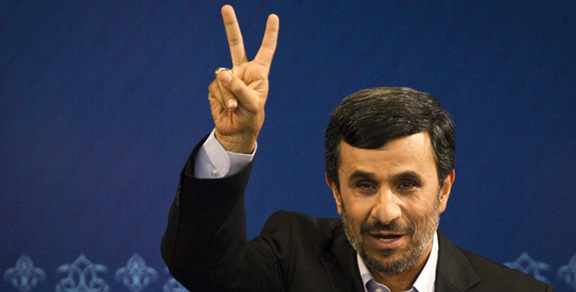 TEHRAN: Iranian President Mahmoud Ahmadinejad on Tuesday accused Washington, Tehran’s arch-foe, of planning to sabotage Pakistan’s nuclear facilities, during a media conference in Tehran.
“We have precise information that America wants to sabotage the Pakistani nuclear facilities in order to control Pakistan and to weaken the government and people of Pakistan,” the hardline president said.
The United States would then use the UN Security Council “and some other international bodies as levers to prepare the ground for a massive presence (in Pakistan) and weaken the national sovereignty of Pakistan,” he added, without elaborating.
Pakistan is the only Islamic nation with nuclear weapons, and has close relations with Iran.
In order to fight al Qaeda and Taliban insurgents in Pakistan, Washington has intensified its aerial operations in Iran’s southeastern neighbour.
Pakistani Islamist groups have at the same time multiplied their assaults on Pakistani military convoys and also on transport and fuel convoys through Pakistani territory intended for NATO troops in Afghanistan.
|









 RSS Feed
RSS Feed